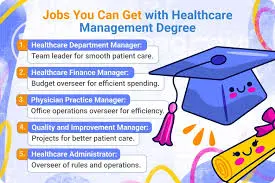Strategic Human Resource Management and Labour Relations Degree: A Path to Managing Workforce Challenges
A Strategic Human Resource Management (SHRM) and Labour Relations degree provides the essential knowledge and skills for individuals interested in managing human resources, overseeing labor relations, and addressing workforce challenges in organizations. This degree prepares students to navigate the complexities of modern employment laws, corporate strategies, and employee relations practices that influence both large and small organizations.
What is Strategic Human Resource Management and Labour Relations?
Strategic Human Resource Management focuses on aligning human resources practices and policies with the overall goals and objectives of an organization. It involves:
- Talent Acquisition: Recruiting, selecting, and onboarding employees that fit with the company’s culture and goals.
- Employee Development: Creating opportunities for employee growth, training, and development to enhance their skills and productivity.
- Performance Management: Implementing systems to monitor, evaluate, and improve employee performance.
Labour relations, on the other hand, deals with the relationship between employers and employees, especially when it involves trade unions and collective bargaining. It focuses on:
- Negotiation: Facilitating discussions between employers and employees, often represented by unions, to reach agreements on wages, benefits, working conditions, and dispute resolutions.
- Legal and Ethical Compliance: Ensuring the organization complies with labor laws, union agreements, and workplace regulations.
- Conflict Resolution: Handling disputes between employees, management, and unions in a fair and effective manner.
Core Topics Covered in the Degree Program
A degree in Strategic Human Resource Management and Labour Relations will cover a range of topics, including:
- Human Resource ManagementRecruiting and hiring processesCompensation and benefitsOrganizational behaviorWorkforce planning
- Labour RelationsLabour laws and policiesCollective bargainingNegotiation skillsDispute resolution techniques
- Organizational DevelopmentChange managementEmployee motivation and engagementLeadership in human resourcesCultural diversity in the workplace
- Strategic Planning and Policy MakingAligning HR strategies with business goalsWorkforce analyticsStrategic decision-making in HR
- Employment LawCompliance with labor laws and regulationsEmployee rights and protectionsEthics in labor relations
Career Opportunities with a Degree in SHRM and Labour Relations
Graduates with a degree in Strategic Human Resource Management and Labour Relations are well-prepared to enter a variety of career fields within human resources and labor relations. Potential job roles include:
- HR Manager/Director: Overseeing the human resources department, including recruitment, training, and employee relations.
- Labor Relations Specialist: Managing negotiations and handling issues related to labor unions and collective bargaining.
- Compensation and Benefits Manager: Designing and overseeing employee pay and benefits packages.
- Employee Relations Specialist: Mediating between employees and management, resolving conflicts, and ensuring compliance with workplace regulations.
- HR Consultant: Advising organizations on HR policies, strategic planning, and workforce management.
- Training and Development Manager: Creating programs to train and develop employees, improving their skills and performance.
- Recruitment Specialist: Managing hiring and recruitment processes, sourcing talent, and aligning candidates with organizational needs.
Why Pursue a Strategic HRM and Labour Relations Degree?
- High Demand for Skilled Professionals: As companies grow and evolve, they need HR professionals who can strategically manage their workforce and maintain positive labor relations.
- Diverse Career Opportunities: The skills learned in this degree program apply to a variety of roles within human resources, labor relations, organizational development, and consulting.
- Impact on Organizational Success: Effective HR management is crucial to business success. Graduates of this program play a key role in shaping an organization’s culture, employee satisfaction, and overall productivity.
Educational Pathway
To pursue a Strategic Human Resource Management and Labour Relations degree, you can typically find programs offered at both undergraduate and graduate levels. Bachelor's degrees focus on building foundational knowledge in HR and labor relations, while master's and professional degrees allow for deeper exploration into strategic management, leadership, and complex labor laws.
Top Skills Gained from the Degree
- Leadership and Decision-Making: Understanding how to make strategic HR decisions that align with company goals.
- Negotiation: Mastering the art of negotiating contracts and resolving conflicts.
- Communication: Effectively communicating policies, procedures, and strategies to employees, management, and unions.
- Problem Solving: Addressing complex workforce issues, from employee dissatisfaction to legal challenges.
- Cultural Competency: Managing a diverse workforce and addressing global and cultural challenges in the workplace.
Conclusion
A degree in Strategic Human Resource Management and Labour Relations provides the foundation for a rewarding career in HR, labor relations, and organizational management. With a focus on aligning HR practices with business strategies and resolving workplace disputes, graduates are equipped to handle the dynamic challenges organizations face. Whether pursuing a career as an HR manager, labor relations specialist, or employee relations consultant, this degree opens the door to a wide range of professional opportunities in an ever-evolving field.
Explore

Unlock Your Potential with an Online Business Degree: The Path to Success Starts Here

Pursuing an Online Finance Degree: A Flexible Path to a Rewarding Career

Pursuing an Online Psychology Degree: A Flexible Path to a Rewarding Career

Pursuing an Online Cybersecurity Degree: A Path to a Growing Field

Unlocking Potential: How HCM Software Transforms Workforce Management for the Modern Business

Exploring Online Healthcare Administration Degrees: A Path to a Rewarding Career in Healthcare Management

Online Degrees for Working Adults: A Flexible Path to Career Advancement

The Best Online Schools for Business Management Degrees: A Guide to Earning Your Degree Online
